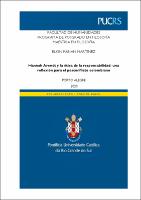| Share record |


|
Please use this identifier to cite or link to this item:
https://tede2.pucrs.br/tede2/handle/tede/9125| Document type: | Dissertação |
| Title: | Hannah Arendt y la ética de la responsabilidade : una reflexión para el posconflicto colombiano |
| Author: | Martinez, Elkin Fabian  |
| Advisor: | Bavaresco, Agemir |
| First advisor-co: | Schio, Sônia |
| Abstract (native): | Nuestro punto de partida, ha sido el conflicto armado y la violencia ejercida entre el Gobierno colombiano y las FARC-EP, durante casi de medio siglo. En la base de nuestras reflexiones, está el pensamiento arendtiano. Siguiendo a Hannah Arendt, mediante la ética de la responsabilidad, es posible la reconciliación con el pasado y la reorientación de los asuntos políticos. Esto en el marco de la violencia del contexto histórico colombiano entre las FARC-EP y el Estado en su punto más clave: el posconflicto. La ética de la responsabilidad en Arendt, implica someter las acciones humanas a una reflexión y juicio en el ámbito de la pluralidad. El pensar, así, se convierte en la base fundamental para que los seres humanos puedan adherir la reflexión en la vida activa. Nuestra investigación, de ese modo, está compuesta de cuatro momentos determinantes. En la primera parte, adentramos en el contexto histórico colombiano del Siglo XX y la memoria de este pueblo. El punto de partida, son las crisis agrarias de los años 20s. En la segunda parte, tratamos el pensamiento político de Hannah Arendt. La capacidad de pensar, de juzgar y del querer [que impulsa un acto], con relación a la acción. En la tercera parte, se aborda la condición humana y el cuidado del mundo. En la cuarta parte, presentamos algunas conclusiones. Colombia, actualmente, atraviesa un importante acontecimiento: la esperanza de un mejor futuro, la oportunidad de mudar su Historia a través de la reconciliación con el pasado. Son varias consideraciones las que se deben tener presente; las cuales forman parte de un proceso de reconciliación: el perdón, la justicia, la verdad, la reparación de las víctimas, la reintegración de los exguerrilleros a la vida pública, la capacidad de comenzar de nuevo, etc. La responsabilidad por elaborar un mejor futuro en Colombia, depende de su capacidad por mantener activa la vida de la mente. |
| Abstract (english): | Our starting point has been the armed conflict and violence exerted between the Colombian Government and the FARC-EP, for almost half a century. At the base of our reflections is arendtian thought. Following Hannah Arendt, through the ethics of responsibility, reconciliation with the past and reorientation of political affairs is possible. This in the context of violence in the Colombian historical context between the FARC-EP and the State, in the so-called post-conflict. The ethics of responsibility in Arendt implies subjecting human actions to reflection and judgment in the field of plurality. The ethics of responsibility in Arendt implies subjecting human actions to reflection and judgment in the field of plurality. Thinking, thus, becomes the fundamental basis for human beings to adhere to reflection in active life. Our research is made up of four defining moments. In the first part, we delve into the Colombian historical context of the 20th century and the memory of this town. The starting point is the agrarian crises of the 20s. In the second part, we discuss Hannah Arendt's political thinking. The ability to think, to judge and to want [that drives an act], in relation to the action. In the third part, the human condition and care for the world are addressed. In the fourth part, we present some conclusions. Colombia, currently, is going through an important event: the hope of a better future, the opportunity to change its history through reconciliation with the past. There are several considerations that must be kept in mind, which are part of a reconciliation process: forgiveness, justice, truth, the reparation of victims, the reintegration of ex-guerrillas into public life, the ability to start again, etc. The responsibility to create a better future in Colombia depends on its ability to keep the life of the mind active. |
| Keywords: | Ética de la responsabilidad Posconflicto FARC-EP Colombia |
| CNPQ Knowledge Areas: | CIENCIAS HUMANAS::FILOSOFIA |
| Language: | spa |
| Country: | Brasil |
| Publisher: | Pontifícia Universidade Católica do Rio Grande do Sul |
| Institution Acronym: | PUCRS |
| Department: | Escola de Humanidades |
| Program: | Programa de Pós-Graduação em Filosofia |
| Access type: | Acesso Aberto |
| Fulltext access restriction: | Trabalho não apresenta restrição para publicação |
| URI: | http://tede2.pucrs.br/tede2/handle/tede/9125 |
| Issue Date: | 3-Mar-2020 |
| Appears in Collections: | Programa de Pós-Graduação em Filosofia |
Files in This Item:
| File | Description | Size | Format | |
|---|---|---|---|---|
| ELKIN FABIAN MARTINEZ .pdf | ELKIN_FABIAN_MARTINEZ_DIS | 895.18 kB | Adobe PDF |  Download/Open Preview |
Items in DSpace are protected by copyright, with all rights reserved, unless otherwise indicated.




